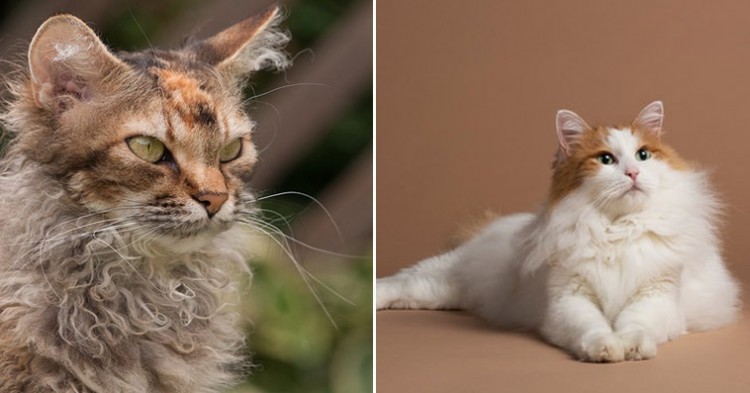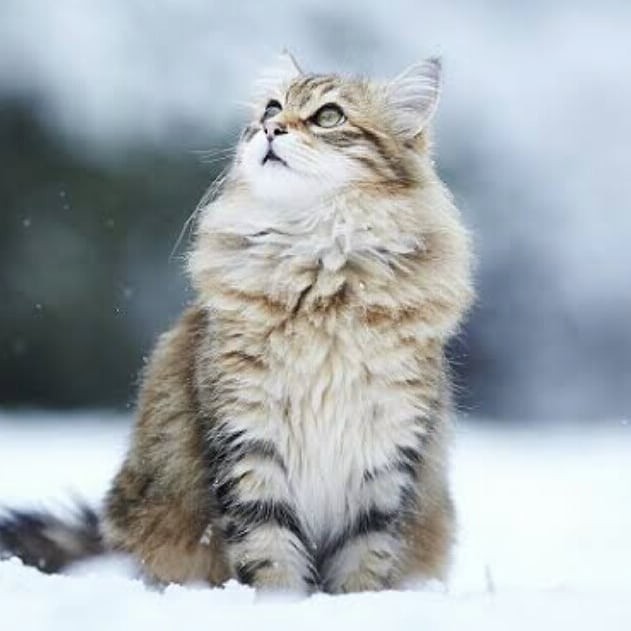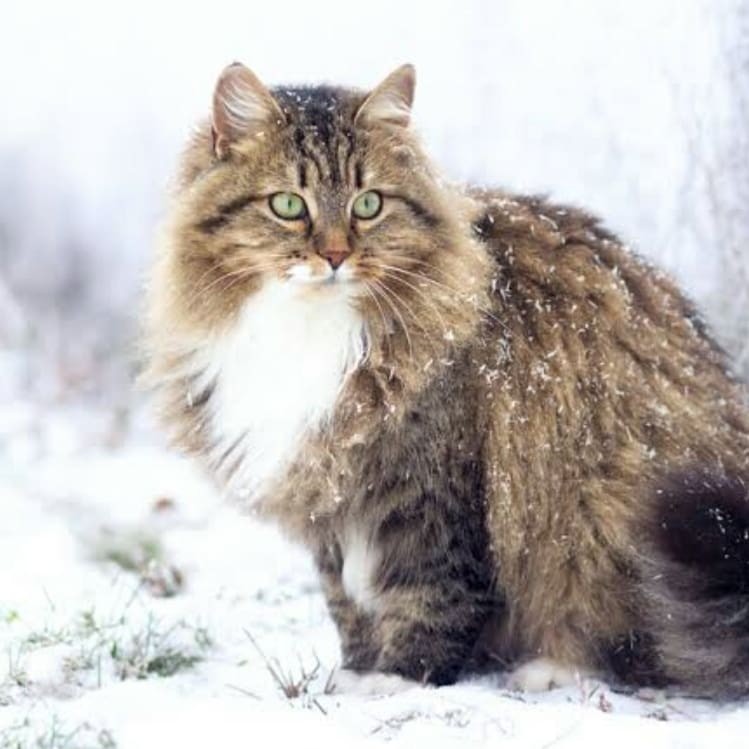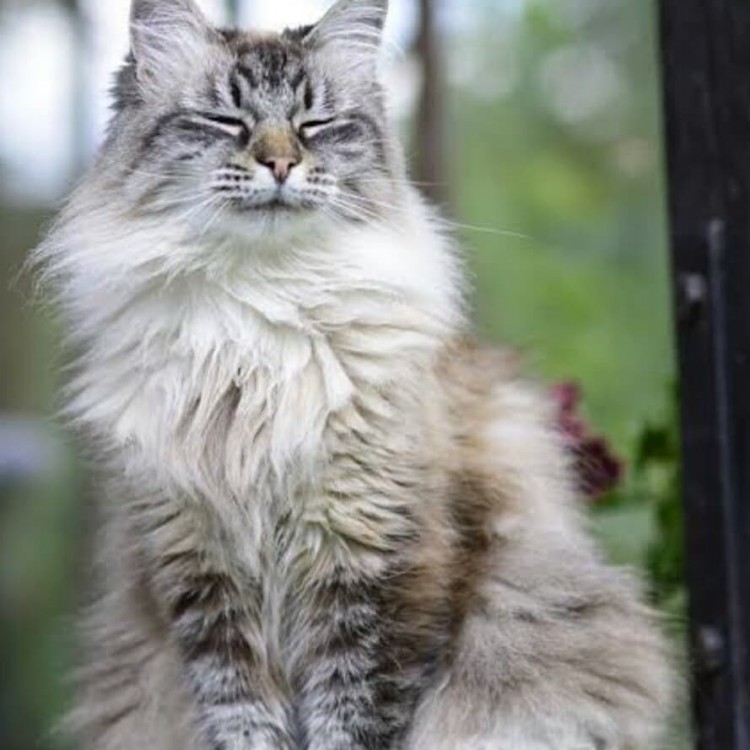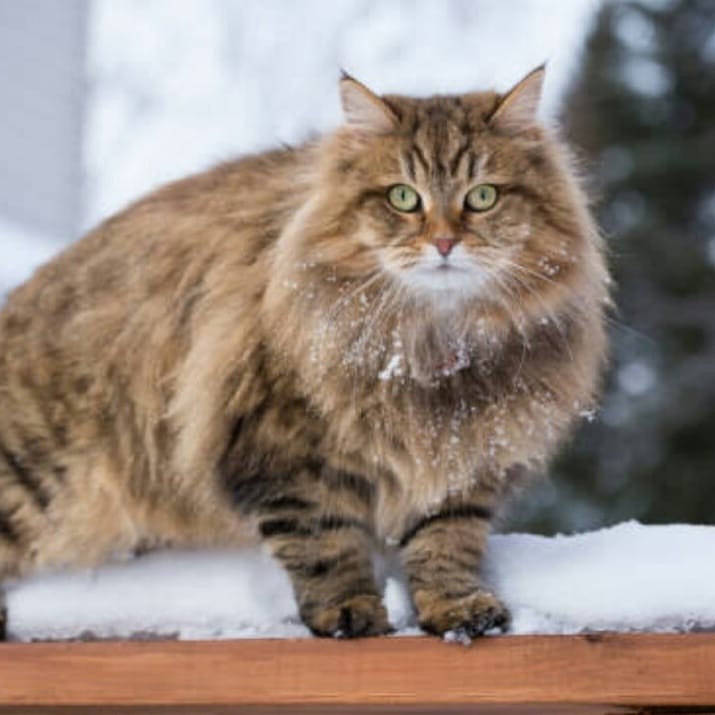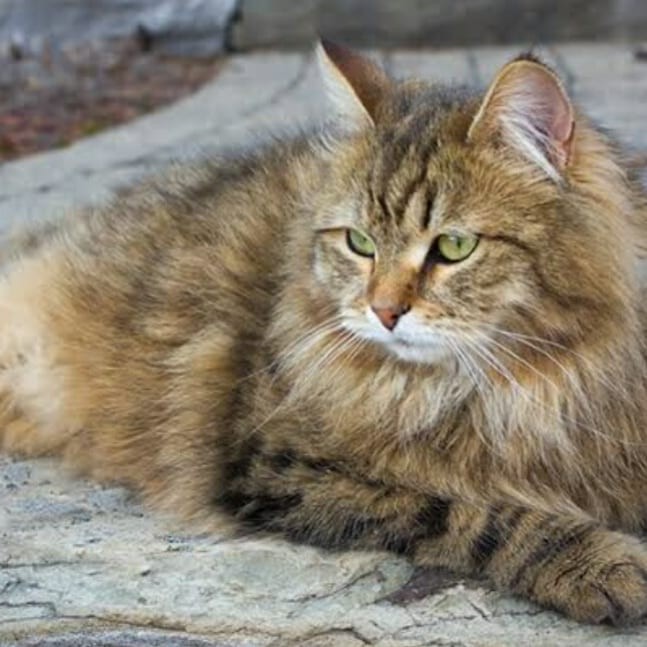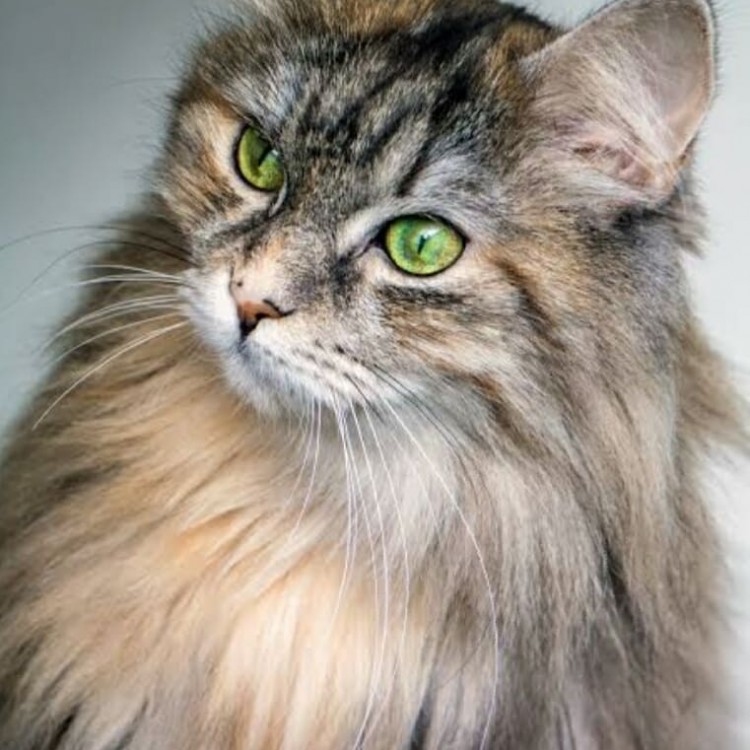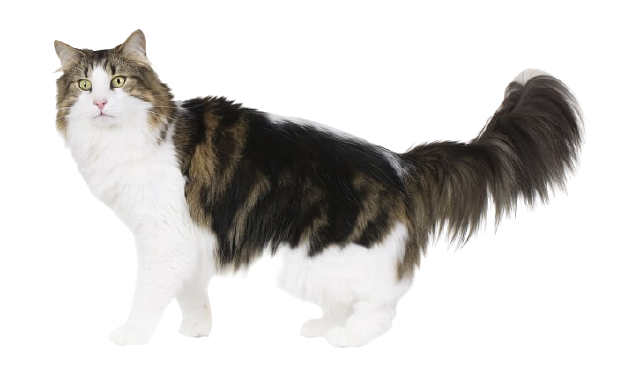
Norwegian Forest Cat
USD $900 - $1500 Price Avg.
Large
Size
No
Lap Cat
12 to 16 years
Lifespan
Breed Information
| Popularity/Rank | 13 |
|---|---|
| Name | Norwegian Forest Cat |
| Other names | Skogkatt / Skaukatt, Norsk Skogkatt / Norsk Skaukatt, Weegie |
| Origin | Norway |
| Size | Large |
| Coat | Dense, Glossy, Silky, Soft, Long Hair |
| Lap Cat | No |
| Lifespan | 12 to 16 years |
| Temperament |
Active, Curious, Intelligent, Lively, Playful, Social, Sweet Active: The Norwegian Forest Cat is an active breed that loves to play and explore. They are curious by nature and love to learn new things. They are also intelligent and lively, making them great companions. They are playful and social, and enjoy spending time with their families. |
| Weight | Female: 9 - 12 pounds, Male: 12 - 16 pounds |
| Colors | Black, Blue, Cinnamon, Cream, Red, Silver, Tabby, White |
| Kitten Prices |
USD $900 - $1500
A Norwegian Forest Cat kitten can cost anywhere from $900 to $1500 USD. The price of a Norwegian Forest Cat kitten depends on the breeder, the reputation of the breeder, and the quality of the kitten. The price of a Norwegian Forest Cat kitten also depends on the parents of the kitten. If the parents are from a good bloodline, then the kitten will be more expensive. If the parents are not from a good bloodline, then the kitten will be less expensive. The quality of a Norwegian Forest Cat kitten also affects its price. A high-quality kitten will be more expensive than a low-quality kitten. So, is it worth it to choose a Norwegian Forest Cat? That depends on what you are looking for in a cat. If you want a high-quality, beautiful cat that will be a loyal companion, then yes, a Norwegian Forest Cat is definitely worth considering! |
Breed Characteristics
| Adaptability | |
|---|---|
| Affection Level | |
| Child Friendly | |
| Dog Friendly | |
| Energy Level | |
| Grooming | |
| Health Issues |
Feline infectious peritonitis, Feline leukemia, Feline immunodeficiency virus, Rabies, Ringworm Is Norwegian Forest Cat cat Hypoallergenic? There is no definitive answer to this question as everyone's allergies are different. However, some people find that they are less allergic to Norwegian Forest Cats than other breeds of cats. This may be because the breed produces less of the protein that is responsible for triggering allergies in some people. If you are considering getting a Norwegian Forest Cat, it is recommended that you spend some time around the breed first to see if you have any reaction. Feline infectious peritonitis (FIP) is a viral disease that affects cats. The virus is a member of the coronavirus family, which includes the common cold virus in humans. FIP is a serious disease that can be fatal, and there is no cure. Treatment is typically supportive, and focuses on relieving symptoms and supporting the cat's immune system. Feline leukemia is a virus that can cause cancer in cats. It is spread through contact with infected saliva, blood, or feces. The virus can cause a variety of cancers, and can also weaken the immune system, making cats more susceptible to other diseases. There is no cure for feline leukemia, but treatment is available to help manage the disease and its symptoms. Feline immunodeficiency virus (FIV) is a virus that attacks the immune system of cats. It is similar to human HIV, and can cause a variety of health problems, including infections, cancer, and neurological disorders. There is no cure for FIV, but treatment is available to help manage the disease and its symptoms. Rabies is a virus that affects the nervous system of mammals, including cats. It is spread through the bite of an infected animal, and can be fatal. There is no cure for rabies, but it can be prevented through vaccination. Ringworm is a fungal infection that can affect the skin, hair, and nails of cats. It is spread through contact with infected animals or contaminated objects, and can be treated with antifungal medication. |
| Intelligence | |
| Shedding | |
| Social Needs | |
| Stranger Friendly | |
| Vocalization | |
| Health Care |
The Norwegian Forest Cat is a hearty, robust breed that is generally very healthy. However, like all cats, they are susceptible to certain health conditions. Some of the most common health concerns for Norwegian Forest Cats include:
• Respiratory problems: Norwegian Forest Cats are prone to respiratory infections and allergies. They should be kept up-to-date on vaccinations and given regular check-ups by a veterinarian. • Obesity: Norwegian Forest Cats are prone to obesity, so it is important to keep them at a healthy weight. • Joint problems: Norwegian Forest Cats are prone to joint problems such as arthritis. • Kidney problems: Norwegian Forest Cats are prone to kidney problems. • Heart problems: Norwegian Forest Cats are prone to heart problems. If you have a Norwegian Forest Cat, it is important to take them to the veterinarian for regular check-ups and to watch for any signs of illness. |
History
The Norwegian Forest Cat is a beautiful, unique breed of cat that has a long and interesting history. The breed almost became extinct at one point, but has since become popular again. The Norwegian Forest Cat's ancestry can be traced back to the Vikings, and the breed is recognized as a national treasure in Norway.
The Norwegian Forest Cat is a large, muscular cat with a thick coat of fur that helps protect them from the cold weather in their native Norway. The breed is known for being very independent and resourceful, and they are excellent climbers. Norwegian Forest Cats were once used as working cats on farms and in forests, but they are now more commonly found as pets.
The Norwegian Forest Cat breed almost became extinct in the early 1900s due to a combination of factors including World War II, which led to a decrease in the number of cats being bred, and an increase in the popularity of other breeds such as Siamese cats. However, dedicated breeders worked hard to keep the Norwegian Forest Cat alive, and by the 1970s the breed was once again common in Norway.
The Norwegian Forest Cat has continued to grow in popularity in recent years, thanks in part to their unique appearance and friendly personality. While they are not yet as common as some other breeds of cat, they are becoming more well-known and loved all over the world.
Description
The Norwegian Forest cat is a large, muscular cat with a thick coat of waterproof fur. They are known for their hunting skills and their love of the outdoors. Norwegian Forest cats are very independent and can be quite aloof with strangers. However, they are very affectionate with their family and friends.
Norwegian Forest cats typically live to be 15-20 years old. They weigh 9-16 pounds and come in a variety of colors, including black, white, brown, gray, and red.
Norwegian Forest cats are very active and playful. They love to climb and explore their surroundings. They are also very independent and can be quite aloof with strangers. However, they are very affectionate with their family and friends.
Norwegian Forest cats generally get along well with other animals, including dogs and children. However, they may be territorial with other cats in their home. Norwegian Forest cats are relatively healthy cats; however, they may be prone to certain health conditions such as hip dysplasia, heart disease, and respiratory problems.
Norwegian Forest cats do best in homes where they have plenty of space to roam and explore. They do not do well in small spaces or in homes where there is not much activity going on. Norwegian Forest cats make great pets for families who are looking for an active and affectionate companion.
Norwegian Forest Cat Posts
Explore Norwegian Forest Cat's photos, videos, activities, stories, and facts.




